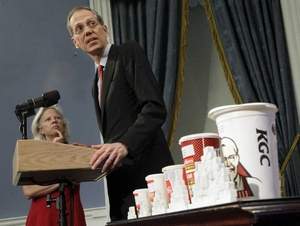
Americans call obesity a national health crisis and blame too much screen time and cheap fast food for fueling it. But a new poll finds people are split on how much the government should do to help -- and most draw the line at attempts to force healthier eating.
A third of people say the government should be deeply involved in finding solutions to the epidemic. A similar proportion want it to play little or no role, and the rest are somewhere in the middle, according to the poll released this month by the Associated Press-NORC Center for Public Affairs Research.
Require more physical activity in school, or provide nutritional guidelines to help people make better choices? Sure, 8 in 10 support those steps. Make restaurants post calorie counts on their menus, as the Food and Drug Administration is poised to do? Some 70% think it's a good idea.
"That's a start," said Khadijah Al-Amin, 52, of Coatesville, Pa. "The fat content should be put up there in red letters, not just put up there. The same way they mark something that's poisonous, so when you see it, you absolutely know."
But nearly 6 in 10 people surveyed oppose taxes targeting unhealthy foods, known as soda taxes or fat taxes.
And when it comes to restricting what people can buy -- like New York City's recent ban of supersized sodas in restaurants -- three-quarters say "No way."
"The outlawing of sugary drinks, that's just silly," said Keith Donner, 52, of Miami. He prefers teaching children to eat better and get moving.
Despite the severity of the problem, most of those surveyed say dealing with obesity is up to individuals. Just one-third consider obesity a community problem that governments, schools, health care providers and the food industry should be involved in.
That finding highlights the dilemma public health experts confront: Societal changes in recent decades have helped spur growing waistlines, and now one-third of U.S. children and teens and two-thirds of adults are either overweight or obese. Today, restaurants dot more street corners and malls, regular-sized portions are larger and a fast-food meal can be cheaper than healthier fare.
In the current environment, it's difficult to exercise that personal responsibility, said Jeff Levi of Trust for America's Health, a nonprofit group that has tracked the rise in obesity.
"We need to create environments where the healthy choice becomes the easy choice, where it's possible for people to bear that responsibility," he said.
The new poll suggests women, who have major input on what a family eats, recognize those societal and community difficulties more than men do.
More than half of women say the high cost of healthy food is a major driver of obesity, compared with just 37% of men.
Patricia Wilson, 53, of rural Speedwell, Tenn., says she must drive 45 minutes to reach a grocery store -- passing numerous burger and pizza joints, with more arriving every year.
"They shouldn't be letting all these fast-food places go up," said Wilson. She nags her children and grandchildren to eat at home and watch their calories and she recalls how her overweight grandmother lost both her legs and then her life to diabetes.
More than 80% of people in the AP-NORC poll said they had easy access to supermarkets, but just as many could get fast food easily.
Food is only part of the obesity equation; physical activity is key too. About 7 in 10 people said it was easy to find sidewalks or paths for jogging, walking or bike-riding. But 63% found it difficult to get around without a car, reinforcing a sedentary lifestyle.





